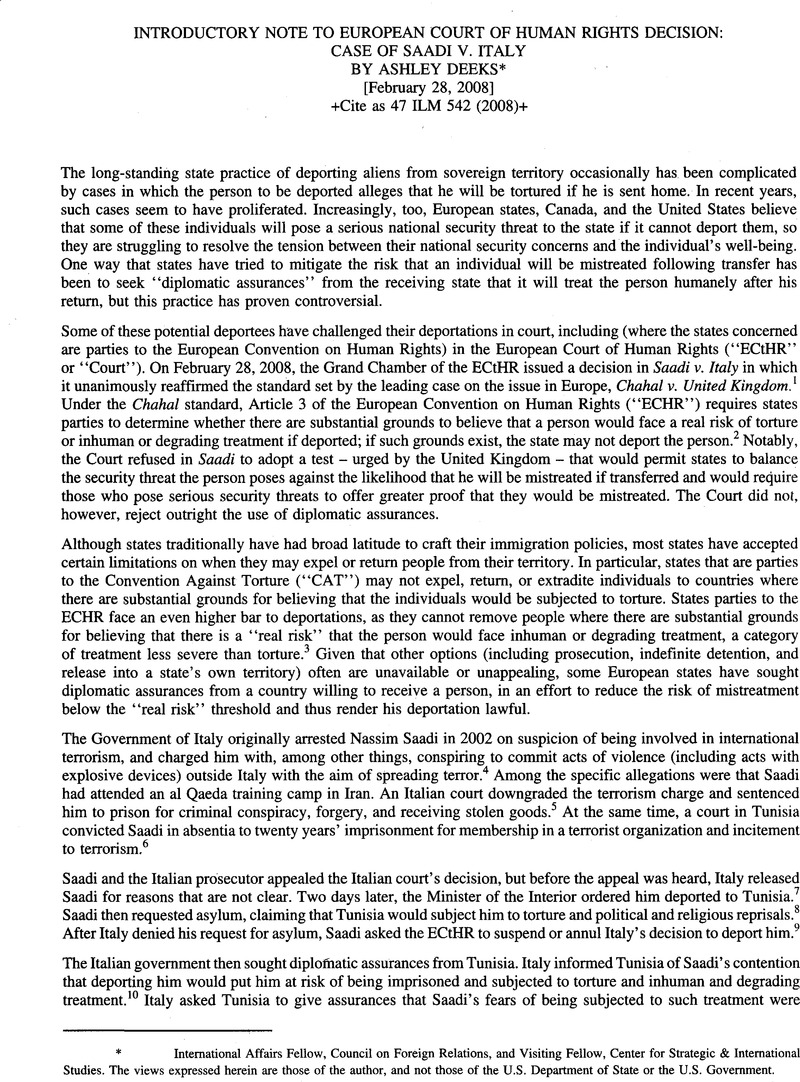Article contents
European Court of Human Rights Decision: Case of Saadi v. Italy
Published online by Cambridge University Press: 27 February 2017
Abstract

- Type
- International Legal Documents
- Information
- Copyright
- Copyright © American Society of International Law 2008
References
Endnotes
1 Saadi v. Italy, Application No. 37201/06, judgment of the Grand Chamber, 28 February 2008, available at http://cmiskp.echr.coe.int/tkpl97/view.asp?action=html&documentld=829510&portal=hbkm&source=externalbydocnumber&table=F69A27FD8FB86142BF01Cl166DEA398649> (hereinafter, “Saadi judgment”); Chahal v. United Kingdom, (1996) 23 E.H.R.R. 413, available at <http://www.worldlii.org/eu/cases/ECHR/1996/54.html.> Chahal was a split decision, with seven judges filing a partial dissent. The dissenters agreed that a state party to the European Convention on Human Rights could not take into account national security considerations to justify the mistreatment of someone within that state's territory, but believed that, where the issue was whether a non-state party would engage in mistreatment, a state party could legitimately “strike a fair balance between, on the one hand, the nature of the threat to its national security interests if the person concerned were to remain and, on the other, the extent of the potential risk of ill-treatment of that person in the State of destination.” Chahal, Joint Partly Dissenting Opinion, para. 1.
2 Although the ECHR on its face lacks a non-refoulement obligation, the ECtHR has imported one into Article 3. Soering v. United Kingdom, judgment of 7 July 1989, Series A no. 161, §§ 90-91 (“The decision by a Contracting State to extradite a fugitive may give rise to an issue under Article 3, and hence engage the responsibility of that State under the Convention, where substantial grounds have been shown for believing that the person concerned, if extradited, faces a real risk of being subjected to torture or to inhuman or degrading treatment or punishment in the requesting country.”).
3 The United States has not assumed a similar non-refoulement obligation related to inhuman or degrading treatment, and interprets the CAT's “substantial grounds” standard to mean a situation in which someone is “more likely than not” to face torture. The United States accepts that its obligations under CAT Article 3 do not permit it to engage in a balancing of interests. Nevertheless, like European states and Canada, the United States is struggling with how to avoid transferring people to face torture without disregarding its national security interests.
4 Saadi judgment, paras, 11-12.
5 Id., para 14.
6 Id., para. 29.
7 Id., paras. 31-32.
8 Id., para. 35.
9 Id., paras. 35, 39.
10 Id., para. 52.
11 Id., paras. 54-55.
12 Id., paras. 111-12.
13 Id., paras. 65-94.
14 Id., paras. 105, 110.
15 Id., paras. 117-123. The full text of the UK intervention in Ramzy v. Netherlands, which replicates its intervention in Saadi, is available at <http://www.redress.org/publications/GovernmentintervenorsobservationsinRamzy%20case22November.pdf> (hereinafter, “Ramzy intervention”).
16 Rairizy intervention at para. 22.
17 Id, para. 30.
18 Saadi judgment, para. 138.
19 Id, para. 147.
20 As a matter of course, the UK already seeks (and obtains) more extensive diplomatic assurances than Italy received in Saadi. See, for example, Memorandum of Understanding Between the Government of the United Kingdom of Great Britain and Northern Ireland and the Government of the Hashemite Kingdom of Jordan Regarding the Provision of Undertakings in Respect of Specified Persons Prior to Deportation, available at <http://www.asil.org/pdfs/ilibukjord050818.pdf.>
21 The UK, for example, in its Prevention of Terrorism Act, developed a system of “control orders” that permits the government, with court oversight, to impose restrictions on individuals suspected of being involved in terrorism-related activity. The limitations include prohibiting them from associating or communicating with specified persons or from visiting specified places; or requiring them to surrender their passport or to report to the government at specific times. Prevention of Terrorism Act 2005, §§ 1-3, available at <http://www.opsi.gov.uk/acts/acts2005/ukpga_20050002_en_l.>
22 Former Prime Minister Tony Blair suggested as much in a 2006 letter to then-Home Secretary John Reid. According to news reports, the letter stated that the UK “will need to look again at whether primary legislation is needed to address the issue of court rulings which overrule the government in a way that is inconsistent with other EU countries’ interpretation of the European Convention on Human Rights.” Further, “A Downing Street source said a range of existing laws could be reviewed and new legislation was also possible. One option under consideration was to amend the 1998 Human Rights Act, which wrote the European Convention into British law, to require a ‘balance between the rights of the individual and the rights of the community to basic security.’ … He said the act could be further amended if British courts blocked moves to deport terror suspects On the basis of ‘memorandums of understanding’ that they would not be tortured. A further possibility would be for Britain to consider withdrawing from specific clauses of the European rights convention if they led to court rulings which placed ‘community safety’ at risk.” Ned Temko & Jamie Doward, “Revealed: Blair attack on human rights law,” The Observer, May 14, 2006, available at <http://www.guardian.co.uk/politics/2006/may/14/humanrights.ukcrime.> Such a decision could put the UK out of compliance with the ECHR, and might also raise questions about UK compliance with the CAT, which does not permit states to take into account national security interests when deciding whether there are substantial grounds for believing that someone would be tortured.
* This text was reproduced and reformatted from the text appearing at the European Court of Human Rights website (visited June 6, 2008) <http://cmiskp.echr.coe.int/tkpl97/view.asp?action=html&documentId=829510&portal=hbkm&source=externalby-docnumber&table=F69A27FD8FB86142BF01C1166DEA398649e>
1 Scozzari and Giunta v. Italy [GC], nOS 39221/98 and 41963/98, ECHR 2000-VIII.
- 1
- Cited by


